Cancelling Audible
Summary: This story walks through my experience cancelling my 5-year Audible subscription and finding non-U.S. alternatives for audiobooks. Total savings: $200.88/year. Time required: 45 minutes.
Discovering the American Subscription in My Banking
It started with a routine check of my RBC online banking. I was reviewing my monthly expenses when I noticed a recurring charge: $16.74/month to “Audible CA*Amzn.com/bill”. This subscription had been charging me every month for the past 5-6 years - that's over $1000 spent on Audible!
Banking Transaction Screenshot
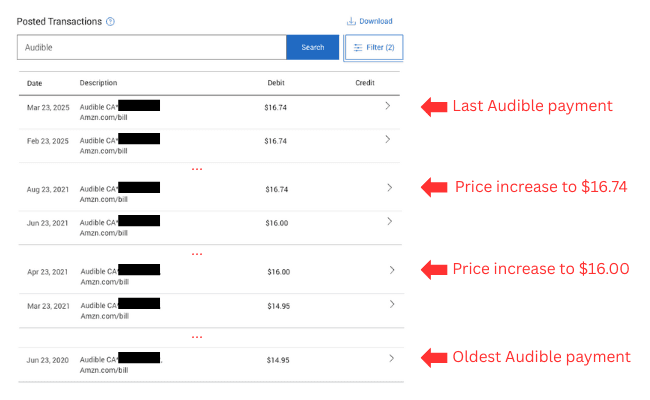
The image shows my Audible charges increasing from $14.95 in 2020 to $16.74 by 2023, with recurring monthly payments totaling over $1000 over 5+ years.
I have enjoyed the Audible app and audiobook experience. But with recent U.S. tariffs and rhetoric about annexing Canada, I'm re-evaluating all my spending.
Learning About Audible's American Ownership
The first question was: is Audible even a Canadian company? So I checked out USAboycott.ca's company profile for Audible to confirm:
Audible
Company Headquarters
Newark, New Jersey, United States
Parent Company
Amazon.com, Inc. (US-based)
Canadian Attributes
Looking deeper into Audible's business practices revealed several concerns for Canadian consumers:
- Limited Canadian representation — Despite marketing specifically to Canadians with a .ca website, they have minimal Canadian employment and operations
- Most content production happens in the US — Despite a $12M investment in Toronto Metropolitan University's Audible Acting Studio in 2018, the majority of production, technology development, and management still occurs in the United States
- Revenue flows to the US — Most of my subscription money was supporting American, not Canadian, jobs and infrastructure investment
To verify these findings, I checked Audible's own LinkedIn profile to see where their employees are actually located:
Looking at Audible's LinkedIn profile revealed their employee distribution. Notice how employees in Canada don't even make the list of top locations:
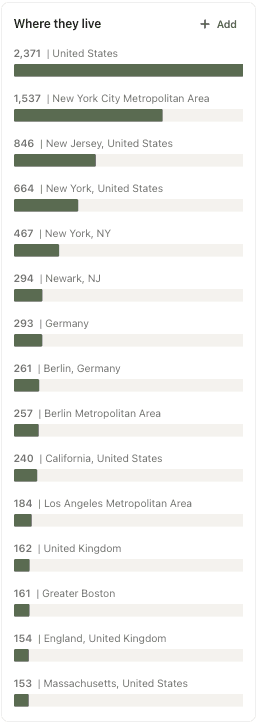
Source: LinkedIn
Key insight: Despite marketing to Canadians through a .ca website, Audible has minimal Canadian employment. While they do collect and remit sales taxes and are subject to the Digital Services Tax, the company's profits primarily flow back to the US, with limited broader economic benefit to Canada in terms of local jobs, corporate income taxes, and community investment.
Researching Canadian Alternatives
Before cancelling, I wanted to ensure I could find suitable Canadian alternatives. I used USAboycott.ca's search feature and typed: “I want to cancel my Audible subscription - where else can I listen to audiobooks?”.
USAboycott.ca Search Results
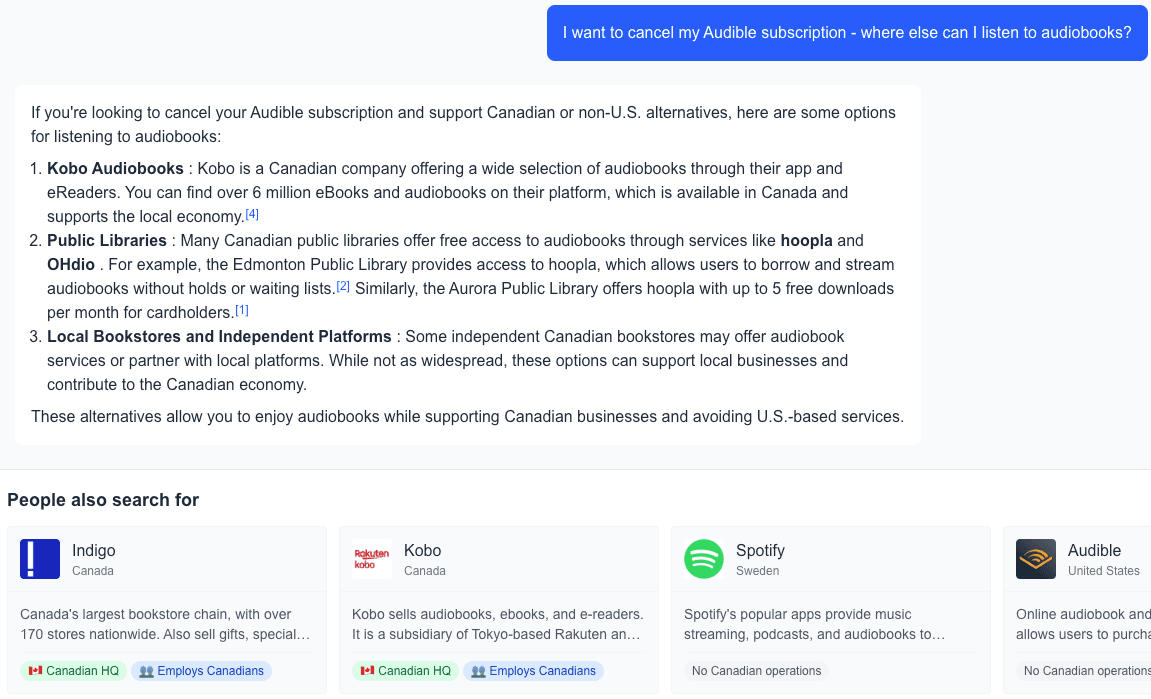
The search results were promising, highlighting several Canadian alternatives:
- Kobo Audiobooks - A Canadian-owned service (Rakuten Kobo Inc. is headquartered in Toronto) offering a similar subscription model at $12.99/month
- Spotify - While not Canadian-owned, they have a significant Canadian presence with offices in Toronto and have been expanding their audiobook offerings
- Public Libraries - Most Canadian public libraries offer free audiobook borrowing through apps like Libby, which supports Canadian public institutions
Preparing to Cancel: The Credits Dilemma
Before cancelling, I checked Audible's cancellation policy and discovered a significant obstacle:
When you cancel your membership, you will lose any unused credits and they cannot be refunded.
This created a dilemma. I had accumulated 3 credits (valued at roughly $45) that would vanish if I cancelled immediately. This was actually the hardest part of cancelling—I delayed for several days while deliberating which audiobooks to purchase, nearly missing my renewal date of April 23, 2025. I almost ended up paying for another month just because I couldn't decide which books to get with my credits.
Using Up My Accumulated Credits
With my renewal date quickly approaching, I finally picked three audiobooks from my wish list to purchase with my remaining credits:
- Buildby Tony Fadell
- Tiny Habitsby BJ Fogg
- The Infinite Gameby Simon Sinek
After purchasing these titles, I confirmed that they would remain in my library even after cancellation. This way, I could extract the maximum value from my existing subscription before ending it.
Cancelling My Audible Subscription
Like most subscription services, Audible doesn't make cancellation easy. You can't cancel through the app—you must use their website and navigate through several retention offers trying to keep you subscribed.
My Cancellation Reason
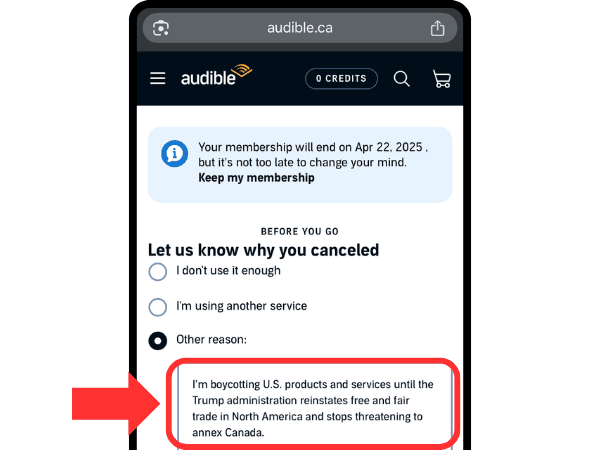
I clearly explained my reason for cancelling: boycotting U.S. companies and advocating for fair trade
Cancellation Confirmation
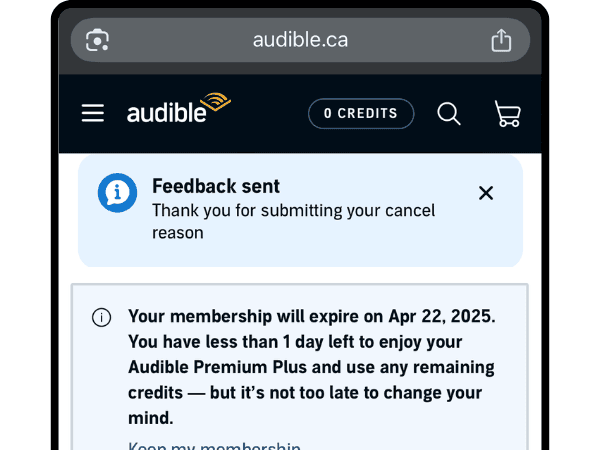
Confirmation that my membership would end just before the next billing cycle
After submitting my feedback and receiving confirmation, I felt relieved to have completed the process before my renewal date. This part of the process only took a few minutes.
Exploring Non-US Alternatives
After cancelling Audible, I first turned to my existing Spotify subscription to see what it offered for audiobooks.
I was pleasantly surprised to discover that Spotify (a Swedish company with Canadian offices) includes audiobooks as part of my Premium subscription - up to 15 hours of listening per month. I found titles like Values by Mark Carney and Atomic Habits by James Clear readily available.
Next steps in my journey
While Spotify works well for my audiobook needs (within the 15-hour monthly limit), I'm still planning to explore more Canadian options:
- Trying Kobo Audiobooks (Toronto-based) for their extensive catalog, especially for months when I might exceed Spotify's 15-hour limit
- Setting up Libby with my local library card for free borrowing
- Investigating Libro.fm, which partners with independent Canadian bookstores
The most important outcome is that I've already stopped sending my subscription money to an American corporation while maintaining access to quality audiobook content, albeit with a 15-hour monthly listening limit. As I explore more Canadian alternatives, I'll be able to further support our local economy while potentially overcoming this limitation.
Financial Impact
Here's a breakdown of the financial impact after cancelling Audible:
| Service | Monthly Cost | Annual Cost |
|---|---|---|
| Audible (previous) | $16.74 | $200.88 |
| Spotify Audiobooks (current) | $0.00* | $0.00* |
| Savings | $16.74/month | $200.88/year |
* $0 additional cost for up to 15 hours of listening per month with my existing Spotify Premium subscription. Beyond that, it's $12.99 for a 10-hour “top up” that can be used over 12 months.
Beyond the direct savings, there's also the satisfaction of no longer automatically supporting an American corporation when Canadian and international alternatives exist. As I eventually try more Canadian options like Kobo, I'll be contributing to companies that maintain a greater Canadian presence.
Lessons Learned
Through this process, I learned a few things:
I'm working through my credit card transactions subscription by subscription - one at a time so it's not overwhelming.
I would have lost valuable credits worth $45 if I hadn't checked the terms before cancelling.
For almost every American service, there's a Canadian or international alternative that works nearly as well.
Final Thoughts
Cancelling Audible was a small step in my journey to redirect my spending away from American corporations. And the (up to) $200/year savings is a nice bonus!
The whole process—from discovering the charge in my banking to finding alternatives and cancelling—took about 45 minutes, spread over a few days. Using Spotify for audiobooks has been seamless so far, and I'm looking forward to exploring more Canadian options.
By clearly stating that I'm boycotting US products due to tariffs and threats to Canadian sovereignty, I feel like I'm sending a message that corporations can relay to their government representatives. If thousands of Canadians cancel with similar reasons, these companies may become advocates for more balanced trade policies to protect their bottom lines. Individual actions, when multiplied, can drive economic and policy change.
#ElbowsUp